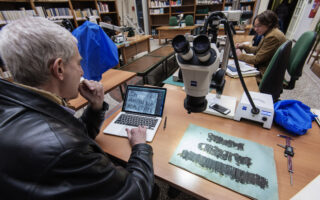Why study in Greece? Two US students tell us
The climate, the way of life and the high standards of the country’s universities brought two young women to Athens and Crete

“I drink freddo every day,” 23-year-old Anya Howko-Johnson from Washington, DC says with a laugh when I asked what has changed since she made the move to Athens three months ago. And it’s not just the iced coffee drink that is so ubiquitous all over Greece. Anya loves the Greek capital’s weekend farmers’ markets, where she gets her weekly supply of fresh vegetables – “they’re so quaint,” says the cooking-loving foodie who just took part in the Athens Marathon and is now looking forward to a trip with her family to the southeast Aegean island of Rhodes.
“The weather is still amazing, even though it’s November, and I’m really enjoying the fall landscapes,” says 22-year-old fellow American Avery Hurst from Georgia, who is studying in Iraklio, Crete. She loves the Mediterranean diet and cuisine, of which olive oil, one of the Aegean island’s most prized products, is such a fundamental part. Needless to say, she is also ecstatic about Crete and all its attractions more generally.
Representatives of a growing trend of American students seeking to spend some time studying at a Greek university, Anya and Avery are Fulbright scholars doing a stint in Greece. The climate is, of course, a steady lure, but the important work being done by the country’s universities to become more extroverted and attract scholars from overseas over the past few years is also bearing fruit. There is the way of life too, of course, not to mention the lower cost of living compared to most of the United States.
Anya recently graduated from Georgetown University with a degree in international relations and a major in international organizations and law, and has published work in major university journals, such as those of Harvard and Columbia. She was also involved in a program for studying immigration in Mexico, which is what brought Greece to her attention. “Your country gets significant inflows and I want to study how climate change is affecting migration,” she says.
“It is also really important to see whether countries receiving large numbers of migrants who are leaving their own countries because of some climate-related issue like flooding or desertification are taking climate change into account when it comes to the formulation of public policy. These people have been compelled to emigrate and they probably won’t be able to return to their countries. And Greece is also one of a very small number of countries with a Climate Crisis and Civil Protection Ministry,” adds Anya.
The young scholar will be working with Athens Law School professor Emmanouela Dousi, who, among other areas, specializes in international law and climate diplomacy, as well as with West Attica University professor of environmental health, education and communication Constantina Skanavis, where they will be focusing on how immigration affects economic policy.
Avery graduated from Purdue in Indianapolis with a degree in biochemistry and molecular biology. She was drawn to Crete by the stellar reputation of its university and particularly of its School of Medicine. “I could have studied in Thessaloniki, but I spoke to some researchers at Purdue and they recommended the University of Crete. I don’t regret my choice. I’ve been here for two months and I can already tell that the standards are very high, and not just because of the people in my lab, but also in the entire institution,” she says.
‘The weather is still amazing, even though it’s November, and I’m really enjoying the fall landscapes’
She is working with Professor Christos Tsatsanis, who, among other things, is studying how changes in the metabolism at the organic level (such as, for example, obesity or resistance to insulin) affect the development of natural immunity.
“You know, the red seaweed that grows off the coast of Kefalonia has anti-inflammatory properties. Generally, I will be studying how foods based on marine species can help combat obesity and immunity disorders,” says Avery.
Sure, it is unlikely that the two students would have anything but positive comments to make when asked about their experience in the short time they have been in Greece – if only out of courtesy – but their obvious enthusiasm leaves no doubt of the sincerity of the sentiments they express. For example, when I ask Avery whether there is anything she has found irritating, she is clear: “No, I have no problems with the university or with Iraklio. The people are warm, the cost of living is lower than in the US and, of course, the island is just gorgeous. I admit that I had very high expectations before coming, but they have all been confirmed.”
Academic attractions
More and more Americans are undeniably choosing Greece as an educational destination. In fact, according to a study by Open Doors 2023, which is published annually by the Institute of International Education (IIE), Greece is the eighth most popular destination for American university students, having received 4,484 of them in the 2021-22 academic year. Greece was in ninth place in 2020-21, way up from 17th place in 2017-18. The top educational destinations for American students are Italy (30,610), the UK (27,503) and Spain (25,348).
At the same time, the number of Greek students heading to the United States is also increasing, with data showing that 2,539 attended American universities in 2022-23, up 5.5% from 2,407 in the 2021-22 academic year. In 2022-23, almost half the Greek students in the US (or 1,141) were in postgraduate or masters’ courses, 790 were in undergraduate courses and the rest were in other academic programs.
“The statistics for this year and the fact that our excellent cooperation with the Greek government and universities is yielding such impressive results fills me with great joy. These are real, tangible results, which have a positive impact on our youth, on our economies and on our bilateral relations. We have achieved so much and I know that together we can achieve even more,” says US Ambassador to Greece George Tsunis.
“The operation of English-language programs at our universities, the low cost of living compared with the United States, and the high caliber of Greek academics and researchers have helped increase the trend for Greece. The reputation of Greek scholars and scientists who have distinguished themselves abroad has also contributed,” observes Artemis A. Zenetou, CEO of the Fulbright Foundation in Greece, which acts as a bridge with the US for students coming to and from Greece.
“The American students often say that their trip to Greece was a dream they’d had since they were in school, that this was where they learned about democracy, philosophy, mythology and also about modern Greece. They also like the openness of the Greek people, the way of life here and, of course, the climate and the sea,” she says.
“More generally, studying abroad is a very special experience because it teaches young men and women to function outside their comfort zone,” adds Zenetou.






